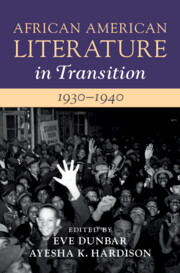Book contents
- African American Literature in Transition, 1930–1940
- African American Literature in Transition
- African American Literature in Transition, 1930–1940
- Copyright page
- Contents
- Figures
- Contributors
- Preface
- Chronology, 1930–1940
- Introduction
- Part I Productive Precarity and Literary Realism
- Part II New Deal, New Methodologies
- Part III Cultivating (New) Black Readers
- Chapter 7 Racial Representation and the Performance of 1930s African American Literary History
- Chapter 8 Black Print Culture of the 1930s
- Part IV International, Black, and Radical Visions
- Index
- References
Chapter 7 - Racial Representation and the Performance of 1930s African American Literary History
from Part III - Cultivating (New) Black Readers
Published online by Cambridge University Press: 25 March 2022
- African American Literature in Transition, 1930–1940
- African American Literature in Transition
- African American Literature in Transition, 1930–1940
- Copyright page
- Contents
- Figures
- Contributors
- Preface
- Chronology, 1930–1940
- Introduction
- Part I Productive Precarity and Literary Realism
- Part II New Deal, New Methodologies
- Part III Cultivating (New) Black Readers
- Chapter 7 Racial Representation and the Performance of 1930s African American Literary History
- Chapter 8 Black Print Culture of the 1930s
- Part IV International, Black, and Radical Visions
- Index
- References
Summary
Writing the history of African American literature in the 1930s necessitates reconsidering issues that emanated from the 1920s, with a view toward showing how they underwent change in the 1930s. Four overlapping foci demonstrate how change, in these two eras, was less disjunctive than evolutionary: (1) a shift in the meaning of racial uplift, (2) quest for racial authenticity, (3) efforts to increase cultural competence, and (4) the writing of literary history. By the mid-1920s, this history can be gleaned, at least initially, in the adult education movement, which had come to define its mission as not simply acquiring knowledge but applying it to problem-solving in real-life situations. Organizations like the American Association for Adult Education (AADE), the Carnegie Foundation, and the Julius Rosenwald Fund provided financial support for education that reconciled intergroup conflicts, inequities, and the marginalization of citizens. Adult education in the 1930s slowly gave way to a list of competing literary critical approaches that revised the earlier conversation taking place about the nature and purpose of performing African American literary history.
Keywords
- Type
- Chapter
- Information
- African American Literature in Transition, 1930–1940 , pp. 211 - 237Publisher: Cambridge University PressPrint publication year: 2022

